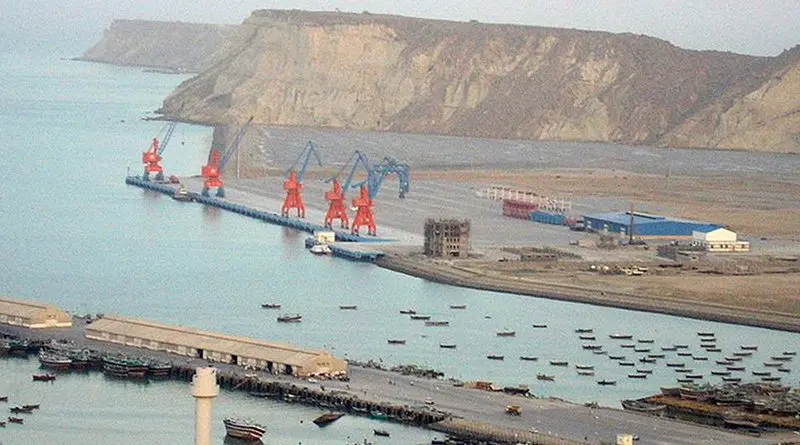Pakistan’s Gwadar Port Project: Shielding Facts – Oped
By Umm-e-Habiba
The Gwadar port is one of the major sea ports in the western Indian Ocean region. It lies in the south-western coast of Pakistan and is only 180 nautical milesi from the Strait of Hormuz, the global energy conduit. Gwadar accordingly serves as a gateway to the Strait which hosts oil worth 17 millionii barrels per day for the international markets. The port’s strategic value is further magnified as it lies at the confluence of three geopolitically significant regions of the world, i.e., Central Asia, Middle East and South Asia.
It is, nonetheless, unfortunate that a project of such tremendous national significance could not lift from the ground beyond the initial phase and despite passage of more than a decade. The statement of Minister of Port and Shipping before the Senate Standing Committee in August 2012 attributing the failure to Pakistan Navy’s hesitancy in parting with the land for the project was quite a misrepresentation of facts.
At best, it was a poor attempt to shift the burden of responsibility for lack of progress in making the port functional from political domain to the navy.
The port was handed over to Port of Singapore Authority (PSA) in February 2007 for a period of 40 years. According to settled terms and conditions of the agreement between PSA and Gwadar Port Authority (GPA), PSA had to invest $3 billion in the project, out of which $550 millioniii were to be invested in the first five years. Several concessions were provided to PSA in the form of Free Trade Zone, exemption from corporate tax etc. A tax-free umbrella was also extended to the construction material and equipment as well as operation of the port.
Moreover the bunker oil used in the port or sold to visiting ships was also declared as duty free. These privileges were declared valid throughout the concession period which was for 20 years from the date of the agreement.
Of a total of 2200 acres of land at Gwadar earmarked for PSA’s operational activities, also included was about 584 acres at Shamba Ismail (Gwadar) exclusively belonging to Pakistan Navy.
Interestingly the land at Shamba Ismail had been under the legal ownership of Pakistan Navy (PN) since 1980. It was procured by Pakistan Navy from the government of Balochistan purely for assembling defensive, logistics and operational needs which made it the official owner much before the GPA-PSA deal was even dreamed up.
Much against above, the land at Shamba Ismail was made part of Gwadar Port Development plan in 2004-5, without following even the rudimentary legal procedure or involvement of Pakistan Navy. The case was presented to the then Prime Minister of Pakistan through Ministry of Port and Shipping in 2008. Subsequent scrutiny of the records and facts revealed PN’s claim to be just and legal.
Considering the land in possession of PN to be vital for national maritime defense, the Prime Minister directed PN to spare only 30 acres of the land for development of rail/road link essential for operations of PSA.
In the larger national interest however, it was agreed to hand over the fully developed land to Ministry of Ports and Shipping/ GPA on the proviso that an equal and appropriate allotment be made at Gwadar; development funds be provided by Ministry of Ports and Shipping and PN be allowed to retain 84 acres at Shamba Ismail for operational errands.
Consequently, Government of Balochistan offered two pieces of land to Pakistan Navy. Feasibility studies for both were conducted, and land proposed at North Bay of Phishukan was found appropriate and indicated to all concerned accordingly.
The August 2012 statement by the Minister for Ports and Shipping thus belies his claim that Government’s failure to transfer 584 acres of land in ownership of PN had been the major obstacle towards meeting contractual terms with PSA. The claim is contradictory to actual facts. PN has communicated its willingness to part with land at Shamba Ismail subject to conditions identified.
It is common knowledge that contract with PSA was the result of political expediency and was executed in haste in a non-transparent, non-professional manner. It contained numerous clauses that at best made the agreement ‘suspect’. Instead of protecting the mutual interests of the contracting parties, the agreement terms overwhelmingly favored PSA. It would be in the fitness of matter if the nature of checks or oversight mechanism between 2007-12 is made public. It is believed and, not without substance that PSA did not fulfill even the conditions of the ‘Concession Agreement’. For the said reason alone, the port which was once deemed to provide an economic windfall opportunity for the country was rendered a white elephant.
The recent handing over of the operational rights of Gwadar port to China though late is indeed a welcome step. One only hopes that the project becomes a profitable national enterprise sooner rather than later.

